

Our Products. Biomass-to-liquids (BTL) is a process used to convert waste biomass, for example from the processing of wood, corn, sugar or other agricultural or municipal waste into high quality liquid fuels that are compatible with current fuelling infrastructure.
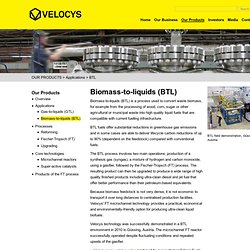
BTL fuels offer substantial reductions in greenhouse gas emissions and in some cases are able to deliver lifecycle carbon reductions of up to 90% (dependent on the feedstock) compared with conventional fuels. The BTL process involves two main operations: production of a synthesis gas (syngas), a mixture of hydrogen and carbon monoxide, using a gasifier, followed by the Fischer-Tropsch (FT) process. The resulting product can then be upgraded to produce a wide range of high quality finished products including ultra-clean diesel and jet fuel that offer better performance than their petroleum-based equivalents.
Velocys technology was successfully demonstrated in a BTL environment in 2010 in Güssing, Austria. Commercialisation. Our solution - Solena Fuels. Solena’s Integrated Biomass-Gas to Liquid “IBGTL” solution is based on an industry-proven Fischer-Tropsch platform coupled with Solena’s proprietary high temperature plasma gasification technology to produce sustainable fuels from low carbon-bearing organic waste.
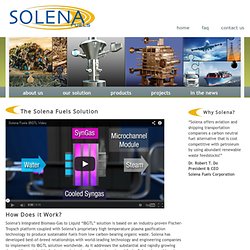
Solena has developed best-of-breed relationships with world-leading technology and engineering companies to implement its IBGTL solution worldwide. As it addresses the substantial and rapidly growing demand for sustainable fuels at market prices for petroleum based fuels, Solena is considered a highly attractive solution and market leader in the sustainable synthetic fuels industry. A unique characteristic of the IBGTL process is that it can handle a wide variety of feedstock and thus is completely "fuel flexible". Unlike standard gasification technologies, Solena’s IBGTL process utilizes a powerful and independent heat source - plasma torches - and can thus accommodate varying heterogeneous feedstock. Energy Dynamics Corporation International - Protecting the Environment thru Gasification of MSW, Tires, Bio Waste, & Coal to produce Diesel and other valuable Fuels and products.
About us. American Combustion. Waste To Energy International. MODERN PLASMA GASIFICATION FACILITY POWERED BY WPP.pdf. Potable Drinking water quality. Another potential source of revenue and profit from the waste to energy plant is the production and sale of potable water.
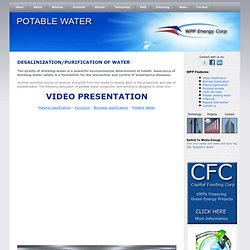
The following discussion of potable water production and bottling is designed to show this. VIDEO PRESENTATIONPlasma Gasification - Pyrolysis - Biomass Gasification - Potable Water WPP uses the latest reverse osmosis desalinization/purification technology to turn seawater, surface water, brackish water, waste water and other polluted water into potable drinking water. In a single step, the system filters, softens and disinfects these water resources to produce water that meets who's regulations for drinking water. The system also clears away naturally occurring organics and minerals, as well as contaminants from pollution, reduces salts, hardness, nitrates, pesticides, color, bacteria, viruses and disinfection byproducts. Desalinization/Purification plant system processes The first-stage concentrate usually feeds one or more downstream stages. Thermal gasification/FICFB Reactor - Güssing Renewable Energy GmbH. The GRE Multi-Fuel Plant, the logical advancement of the plant developed in Güssing and in use there since 2002, reliably provides energy with system relevance – i.e., a minimum of 7.000 hours per annum – and, in addition to the feedstock wood, also allows waste materials rich in hydrocarbon, dried sewage sludge, and the like, to be used as feedstock for gas generation.
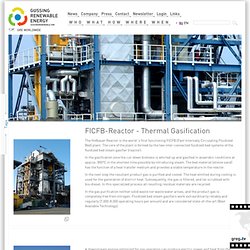
The energetic exploitation of waste otherwise unusable as a material is increasingly becoming of interest to communities, as waste management presents an enormous logistic and financial burden which will still increase in the future. In gas generation the toxic potential of the waste is eliminated without causing harm to the environment. American Combustion. ENCORE: Advanced Pyrolysis Technology. The ENCORE Transformation System is the “best in class” waste-to-energy technology.
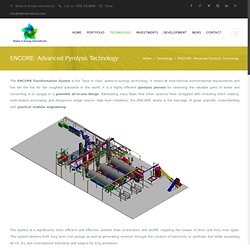
It meets all international environmental requirements and has set the bar for the toughest standards in the world. It is a highly efficient pyrolysis process for removing the valuable parts of waste and converting it to syngas in a patented all-in-one design. Eliminating many flaws that other systems have struggled with including batch loading, multi-station processing and dangerous single reactor, high-heat chambers, the ENCORE simply is the marriage of great scientific understanding with practical modular engineering. The System is a significantly more efficient and effective solution than incineration and landfill, negating the reason to burn and bury ever again. This system delivers both long term cost savings as well as generating revenue through the creation of electricity or synthetic fuel while surpassing all US, EU and International Standards and targets for CO2 emissions.